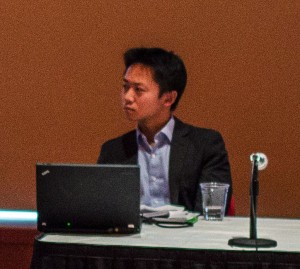Ken Yeung ’03, Senior Manager for Walmart Global eCommerce, participated in a panel Thursday as part of last week’s symposium on Sustainability and Corporate Social Responsibility. Yeung graduated from Grinnell with a B.A. in History; he also earned a masters in Communication Management and an MBA. As part of the symposium, Yeung discussed Walmart’s strategies for changing products, packaging and fuel use in a movement toward corporate sustainability. Yeung sat down with the S&B’s Meg Schmitt to discuss his sustainability efforts with the superstore.

Did you ever picture yourself working for Walmart as a student at Grinnell?
No, Walmart was actually my fourth job since college. I had left in between for business school and other stuff. I never really [expected to work for Wal-Mart], but I did shop there! I didn’t have a clear career path leaving here. I didn’t even know what I was going to do.
Has Walmart consistently been corporately responsible in its policies, or is this a recent evolution in response to public pressure?
Our mission hasn’t changed. Fifty-one years ago the company was founded with the same mission as it is today: save people’s money so they can live better. Obviously the first forty years [were] more focused on the save money part and as we have gotten bigger, in tandem there came a responsibility that we realized, ‘Hey, we can’t just focus on one thing’ and living better really means more than just having more money in your pocket. I think it’s a slow evolution, but I have to say if you look at retailers—if you compare Walmart with Target, Kmart, Sears, Macy’s—Walmart’s probably doing the most, out of anybody.
Walmart has recently received some bad press regarding its expansion into other countries; do you see Walmart as being sustainable in their expansion?
[Regarding the textile factory fire in Bangladesh,] the facts are that a vendor of ours subcontracted work out to a company that was not allowed to do business with us without our knowledge. It’s very difficult, because, again, at what point do you stop monitoring? You can do audits… [but] an interesting story that we always tell is that when our people go visit factories in South Asia, the management will take you floor to floor [but] skip a floor because what they do is, you go to first floor and check the fire extinguisher, and then they say ‘okay, we’ll take you to the second floor.’ In the meantime, someone’s taking that fire extinguisher from the first floor to the second floor! But these [incidents] happen every day, and having a rigorous program in place is the most effective and efficient way to avoid these things happening. In my experiences, the percent of suppliers meeting or exceeding expectations has increased yearly. … It’s a very slow process, but considering the number of suppliers we have, we’re making progress. [Our monitors] actually seek to work with the suppliers, they try to help them in providing better wages, safer work environments, [and making] sure the raw supplies are sustainably sourced.
As senior manager for Walmart Global eCommerce, what do you think can be done within e-commerce to be corporately responsible and sustainable?
The interesting thing [about my role in e-commerce] is we’re in 13 markets and it’s growing so fast, it’s growing much faster than retail stores. However, we are not the leader in the e-commerce. Amazon is ten times our size within e-commerce. So I think the opportunity is [in] exposing these new customers that we are reaching, because in e-commerce you don’t need a store or hundreds of stores to get the scale to run a business. It is about educating them by giving them access to these products that are sustainable, but also we are sourcing, for example, coffee from small, local, women-owned businesses from Guatemala and other Central American countries. And so with our presence, either in existing markets or new markets, it gives us new opportunities to reach those suppliers or customers that we would not have been able to leverage our scale previously.
You also mentioned in your presentation Walmart’s efforts to work with local farmers in selling their produce through Walmart. Would you know if there have been any similar efforts at the Grinnell branch Walmart?
The move towards sustainable agriculture happened while I was in Benville, Arkansas. I worked with this guy in produce … [who] left the company [because although] he was running this huge business, he felt so dedicated to this new initiative that he wanted to see it through to make it happen. I don’t know how it actually happens, but I do know that [at] each store, the general store manager has the authority to source local products. There is a process for them to go through, but many stores do source local products because you have to source local products in order to compete.
It certainly started [out of popularity] … we started these initiatives in sustainability, we thought ‘hey it saves money, why aren’t we doing it?’ and then it’s also good for our customers, so it actually fulfills our entire brand promise.


















































